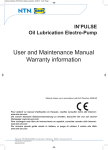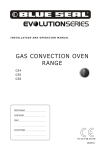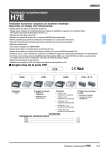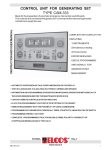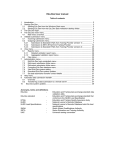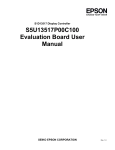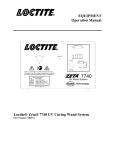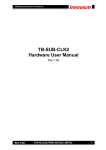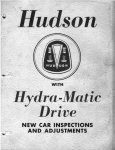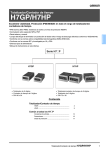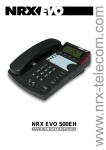Download Self-powered Tachometer H7ER
Transcript
Self-powered Tachometer H7ER Revolutions displayed up to five digits. Dual revolution display according to encoder resolution used; 1000 s–1/1000 min–1 or 1000.0 s–1 /1000.0 min–1 Switchable dual revolution display type available (-NV1 models); extended up to 10000 min–1 Ordering Information Tachometers Count input Cou pu Max. revolutions displayed (applicable encoder resolution) Display sp ay 1000 s–1 (1 pulse/rev.), 1000 min–1 (60 pulse/rev.) Light-gray body 1000.0 s–1 (10 pulse/rev.), 1000.0 min–1 (600 pulse/rev.) ←→ 10000 min–1 (60 pulse/rev.) (switchable) Black body Light-gray body Black body PNP/NPN universal DC lt i t voltage input 7-segment LCD with backlight H7ER-NV-H H7ER-NV-BH H7ER-NV1-H H7ER-NV1-BH 7-segment LCD H7ER-NV H7ER-NV-B H7ER-NV1 H7ER-NV1-B No-voltage input 7-segment LCD H7ER-N H7ER-N-B --- --- Model Number Legend H7ER - N 1 2 3 4 1. Count Input None: No-voltage input V: PNP/NPN universal DC voltage input 3. Case Color None: Light gray B: Black 2. Number of Digits None: 4 digits 1: 5 digits 4. Display None: 7-segment LCD without backlight H: 7-segment LCD with backlight Accessories (Order Separately) Lithium Battery Y92S-36 Wire-wrap Terminal (Set of two Terminals) Y92S-37 Flush us Mounting ou g Adapter dap e 26 mm 24.8 mm 45 mm 48.8 mm Y92F-75 Y92F-77B 19 New H7ER New H7ER Specifications General Item H7ER-NV-j H7ER-NV-jH H7ER-N-j H7ER-NV1-j H7ER-NV1-jH Operating mode Up type Mounting method Flush mounting External connections Screw terminals, Wire-wrap Terminals (see note 3) Display 7-segment LCD with or without backlight (character height: 8.6 mm) (see note 4) Number of digits 4 Count input PNP/NPN universal DC voltage input Max. counting speed 1 kHz 10 Hz Max. revolutions displayed (see note 5) 1,000 s–1 (When encoder resolution of 1 pulse/rev is used.) 1,000 min–1 (When encoder resolution of 60 pulse/rev is used.) 1,000.0 s–1 (When encoder resolution of 10 pulse/rev is used.) 1,000.0 min–1 (When encoder resolution of 600 pulse/rev is used.) ←→ 10,000 min–1 (When encoder resolution of 60 pulse/rev is used.) (Switchable with switch) Attachment Waterproof packing, flush mounting bracket, revolution unit labels (see note 5) Approved standard UL508, CSA C22.2 No.14, Lloyds Conforms to EN61010-1/IEC61010-1 (Pollution degree2/overvoltage category III) Conforms to VDE0106/P100 Note: 5 No-voltage input PNP/NPN universal DC voltage input 1. Reset is not available. 2. 3. 4. 5. When there is no input, the display will be 0.0 or 0. Separately ordered Wire-wrap Terminals (Y92S-37) are required. Only PNP/NPN Universal DC voltage input models have a backlight. “rpm”, “rps”, “s–1” and “min–1” labels are included. Ratings Item H7ER-NVj-j H7ER-NVj-jH H7ER-N-j Supply voltage Backlight model: 24 VDC (0.3 W max.) (for backlight lit) No-backlight model: Not required (powered by built-in battery) Not required (powered by built-in battery) Count input High (logic) level: 4.5 to 30 VDC Low (logic) level: 0 to 2 VDC (Input impedance: Approx. 4.7 kΩ) No voltage input short-circuit impedance: Maximum short circuit im edance: 10 kΩ max. Short-circuit residual voltage: 0.5 V max. Minimum open impedance: 750 kΩ min. Max. counting speed 4-digit models: 1 kHz 5-digit models: 10 kHz 1 kHz Minimum signal width 10 Hz: 0.05 ms 1 kHz: 0.5 ms Terminal screw tightening torque 0.98 N S m max. Ambient temperature Operating: Storage: Ambient humidity Operating: 25% to 85% Reset input 20 –10°C to 55°C (with no condensation or icing) –25°C to 65°C (with no condensation or icing) New H7ER New H7ER Characteristics Item H7ER-NVj-j H7ER-NVj-jH H7ER-N-j Insulation resistance 100 MΩ min. (at 500 VDC) between current-carrying metal parts and exposed non-current-carrying metal parts, and between the backlight power supply and count input terminals/reset terminals for backlight models 100 MΩ min. (at 500 VDC) between current-carrying metal parts and exposed non-current-carrying metal parts Dielectric strength 1,000 VAC, 50/60 Hz for 1 min between current-carrying metal parts and exposed non-current-carrying metal parts and between the backlight power supply and count input terminals/reset terminals for backlight models 1,000 VAC, 50/60 Hz for 1 min between current-carrying metal parts and exposed non-current-carrying metal parts Impulse withstand voltage 4.5 kV between current-carrying terminal and exposed non-current-carrying metal parts Noise o se immunity u y Square-wave noise generated by noise simulator (pulse width: 100 ns/1 µs, 1-ns rise) ±600 V (Between count input terminals) ±500 V (Between count input terminals) ±480 V (Between the backlight power supply terminals for backlight models) Static immunity ±8 kV (malfunction) Vibration resistance Malfunction: 0.15-mm single amplitude at 10 to 55 Hz for 10 min each in 3 directions Destruction: 0.375-mm single amplitude at 10 to 55 Hz for 2 hrs each in 3 directions Shock resistance Malfunction: 200 m/s2 3 times each in 6 directions Destruction: 300 m/s2 3 times each in 6 directions EMC (EMI) Emission Enclosure: (EMS) Immunity ESD: Enclosure rating Front panel: Terminal block: Weight (see note) No-backlight model: Approx. 60 g Backlight model: Approx. 65 g Note: EN50081-1 EN55022 class B EN50082-2 EN61000-4-2: 4-kV contact discharge (level 2) 8-kV air discharge (level 3) Immunity RF-interference from AM Radio Waves: ENV50140: 10 V/m (80 MHz to 1 GHz) (level 3) Immunity RF-interference from Pulse-modulated Radio Waves: 10 V/m (900 MHz ± 5 MHz) (level 3) ENV50204: Immunity Conducted Disturbance: ENV50141: 10 V (0.15 to 80 MHz ) (level 3) Immunity Burst: EN61000-4-4: 2-kV power line (level 3) 2-kV I/O signal line (level 4) IP66, NEMA4 with waterproof packing IP20 Weight includes waterproof packing and flush mounting bracket. Reference Value Item Battery life Value 7 years min. with continuous input at 25°C (lithium battery) Note The battery life is calculated according to the conditions in the left column and therefore is not a guaranteed value. Use these value as reference for maintenance or replacement. 21 New H7ER New H7ER Nomenclature Front view H7ER Not used Counting speed switch For H7ER-NV1-jj Bottom view Counting Speed Switch Settings and Unit Label Application Model Counting speed switch setting (see note) Max. revolutions displayed Applicable encoder resolution Applicable unit label 10000 min–1 (default setting) 60 pulse/rev. “min–1” or “rpm” 1000.0 min–1 600 pulse/rev. “min–1” or “rpm” 1000.0 s–1 10 pulse/rev. “s–1” or “rps” 1000 min–1 60 pulse/rev. “min–1” or “rpm” 1000 s–1 1 pulse/rev. “s–1” or “rps” Front panel H7ER-NV1-jj Terminal block H7ER-N-j H7ER-NV-jj Note: No setting is required Perform switch setting before mounting to a control panel. Operation Operating Modes H7ER Tachometer Incrementing Operation Within Unit Time (Up) Count period Count period 0.25 s (1 s) (1 s) Internal gate Display refreshed Counter reset Internal count value Number display Previous count value display Display refreshed every 1.25 s 22 Display refreshed every 1.25 s Refresh New H7ER New H7ER Dimensions Note: All units are in millimeters unless otherwise indicated. H7ER-N Panel Cutout Separate mounting 60 min. 45 +0.5 0 22.2 +0.5 0 Dimensions with Flush Mounting Bracket Joint mounting (48 Units - 2.5) +1.0 0 22.2 +0.5 0 Waterproofing is not possible for joint mounting • • • When mounting, insert the Counter into the cutout, insert the adapter from the back and push in the Counter while making the gap between the front panel and the cutout panel as small as possible. Use screws to secure the Counter. If waterproofing is desired, insert the waterproof packing. When several Counters are installed, ensure that the ambient temperature will not exceed specifications. The appropriate thickness of the panel is 1 to 5 mm. 23 New H7ER New H7ER Installation Terminal Arrangement Bottom view: View of the Tachometer rotated horizontally 180° Backlight Model No-backlight Model Backlight 24 VDC Pulse input Pulse input Connections H7ER Tachometer Note: Select input transistors according to the following: Dielectric strength of the collector y 50 V Leakage current < 100 µA (1 µA for no-voltage input model) PNP/NPN Universal DC Voltage Input Models With Backlight No-voltage Input Model Transistor Input Transistor Input (Open Collector of an NPN Transistor) Open collector of an NPN transistor or Open collector of an NPN transistor Open collector of an PNP transistor Backlight 24 VDC Input PNP/NPN Universal DC Voltage Input Models Without Backlight Transistor Input Open collector of an NPN transistor or Open collector of an PNP transistor Input 24 Input New H7E New H7E Accessories (Order Separately) New H7E (Except for PCB-mounting Counter) The New H7E models are supplied with a mounting bracket and nut. Additionally, the Flush Mounting Adapters shown here allow the New H7E models to be fitted to existing panel cutouts. Y92F-75 Flush Mounting Adapter for 26 45.3 Rectangular Cutout Use mounting bracket supplied with the Counter Panel Cutout Y92F-77B Flush Mounting Adapter for 24.8 48.8 Rectangular Cutout Use mounting bracket supplied with the Counter Panel cutout 24.8 28.8 24.2 22.2 45.2 48.2 53.8 48.8 4 Y92S-37 Wire-wrap Terminal (Set of Two Terminals) 44.8 Wire-wrap terminal (1 × 1 mm) 24 22 2 48 When using the Wire-wrap Terminal, be sure to use the correct wires and peripheral devices. (The correct wires, bits and sleeves are shown in the table on the right.) Y92S-36 Lithium Battery (3 V) Wire Bit 5 Sleeve 48.5 17.1 Wrapped state AWG22 2-A 2-B Normal AWG24 1-A 1-B Normal AWG26 3-A 1-B Normal 24.5 dia. 7.7 PCB-mounting Counters XR2A-2801-N 28-pin Socket Note: 30 When using the Socket, use the PCB processing dimensions previously provided. New H7E New H7E Precautions New H7E (Except for PCB-mounting Counter) ! WARNING ! Caution This product has a built-in lithium battery. Do not short-circuit the + and – terminals, charge, disassemble, deform, or expose the battery to fire. The battery may explode (break), catch fire, or cause liquid leakage. If a voltage other than the rated one is applied, internal elements may be damaged. Do not use the Counter in the following places: • • • ! Caution Do not use any battery other than the specified one (Y92S-36). Using another battery may cause liquid leakage or breakage, resulting in malfunction or injury. Before Use • An insulation sheet has been inserted to maintain the quality of Locations subject to direct sunlight. Locations subject to corrosive gases. Locations subject to dust. Reset Input and Count/Timer Input • The H7E operates using its built-in Battery. If the H7E is connected to a device that has +V and OUT terminals that are connected with a diode as shown in the circuit diagram, the circuit indicated by the arrow 1 or 2 will be formed when the device is turned OFF. As a result, the H7E may be reset or count by one. It is recommended that such devices not be connected to the H7E. the Totalizer in the event of a long period without use. Be sure to remove this sheet before attempting to use the product. Remove the insulation sheet and press the Reset Key on the front panel of the Counter. (With the H7ER-N,-NV(-H),-NV1(-H), models, “0” or “0.0” will be displayed after 1 s.) Insulation Sheet Devices Internal circuit H7Ej-N Reset Key • • Switch settings on the Counter must be performed before mounting it to a control panel. Do not use the Counter in the following locations: • S Locations subject to severe changes in temperature. S Locations subject to condensation as the result of high humidity. Mounting Precautions for Flush Mounting Although the operating section is watertight (conforming to NEMA4, IP66), rubber packing is provided to avoid water leakage through the gap between the Counter and panel cutout. Unless this rubber packing is tightly squeezed on, water may permeate inside the panel. Therefore, be sure to tighten the screws for fixing the Flush Mounting Bracket. (Excessive tightening may also deform the rubber packing.) Screw for the Flush Mounting Bracket The wider side must face the panel. Adapter • • Count/Timer input or reset input If an excessive voltage is applied to the count/timer input or reset input terminals, the internal elements may be damaged. Ensure that the following voltages are not exceeded: S PNP/NPN universal voltage input model: 30 VDC S AC/DC voltage input model: At count/timer input: 240 VAC (peak voltage: 338V) 240 VDC At reset input: 3 VDC (no-voltage input) S No-voltage input model: 3 VDC S Avoid wiring close to high-tension or large-current lines. Do not remove the outer case when voltage is being applied to the power supply terminals or the input terminals. The input for the H7Ej-NFV-j is a high-impedance circuit and so influence from an induced voltage may result in malfunction. Therefore, when the input signal wiring is longer than 10 m (line capacitance of 120 pF/m, at room temperature), it is recommended that a CR filter or a bleeder resistor is connected. Panel 31 New H7E New H7E Count/Timer Input or Reset Input to More than One H7E Counter at a Time • PNP/NPN Universal DC Voltage Input No-voltage Input and PNP/NPN Universal DC Voltage Input Models • The operation of the Counter may be affected if the line voltage of the power supply exceeds 500 pF (about 10 m, with parallel wires of 2 x 2 mm). Keep all wires as short as possible. When using shielded wire, line capacitance may occur. AC/DC Multi-voltage Input Models • or When connecting count/timer input from an SSR to the Counter that operates with AC/DC voltage input, use OMRON’s G3TA-IA/ID SSR (for DC) whose leakage current is 0.1 mA max. or connect a bleeder resistor in parallel to the input circuit of the Counter. or or Note: • or H (Reset ON) level must be 4.5 V minimum. 4.7 (kΩ)/N + V H= 4.7 (kΩ)/N + R *Bleeder resistor The voltage between terminals 1 and 2 must be 1.5 V maximum when the SSR is OFF. No-voltage Input Backlight Power Supply • To reduce variation in the brightness of the backlight when using more than one H7E with a backlight, use the same power supply for all the backlights. or Note: 1. The leakage current of the transistor used for input must be less than 1 µA. 2. The forward voltage of the diode must be as low as possible (i.e., 0.1 V maximum with an IF of 20 µA) so that the voltage between terminals 3 and 4 will be 0.5 V when the reset input is ON. Input and Power Supply No-voltage Input Models • • Leakage current: 0.1 mA max. or Do not impose voltage on the Counter if the Counter is a model that operates with no-voltage input, otherwise the internal circuit of the Counter may be damaged. Do not connect any single input signal in parallel to Counter models operating with no-voltage input and those operating with voltage input, otherwise the Counters may malfunction. • When connecting the DC power supply for the backlights, be sure to connect the polarities correctly. Input Verification with the H7ET Time Counter (When the time range is not set to 0s to 999h59m59s ) The decimal point of the LCD blinks every other second while an input signal is being applied. If the decimal point is not blinking, the input signal is not being received correctly. Check the input signal connections. Unit Label for Time Counter and Tachometer A unit label has been packed with the Counter. Use in accordance with the application. When connecting a sensor to the Counter that operates with no-voltage input, make sure that the sensor has open collector output. Sensor Battery Replacement • 32 When connecting an open collector input from a transistor to the Counter that operates with no-voltage input, make sure that the leakage current of the transistor is 1 µA maximum. Remove the wiring when replacing the Battery. Do not come in contact with any item to which high voltage is being applied. Doing so may result in electric shock. Before changing the Battery, the person should ensure that they are not carrying any static electric charge. Procedure for replacing the Battery (refer to the diagrams below): 1. Using the tool, pry open the lift-tab on the case. (1) 2. Pull the body out of its outer case. (2) 3. Lift the Battery up by the edge and remove it. (3) When removing the Battery, do not come in contact with the display area or any internal parts. New H7E New H7E 4. Wipe the back of the new Battery before inserting it. 5. Ensure that the + and – terminals are correctly oriented. 6. After replacing the Battery, re-insert the body into its case. (4) Check that the case is securely held in by the lift-tab. 7. Press the Reset Key before use (not necessary for H7ER-N,-NV,-NV1). (5) Tool (1) (2) (1) Battery EN/IEC Standards The count or timer input, reset input, and backlight power supply terminals of the no-voltage input or PNP/NPN universal DC voltage input models (H7Ej-N,-N1, H7Ej-NV(-H),-NV1(-H)) are not isolated. A SELV power supply conforming to Appendix H of IEC61010-1 should be used for the count or timer input, reset input and backlight power supply terminals. A SELV power supply is a power supply for which the input and output have double or reinforced insulation, and for which the output voltage is 30 Vrms with 42.4 V peak or 60 VDC max. (Only the H7Ej-NVj-H has a backlight.) The terminals for count or timer input and reset input for AC/DC multi-voltage input models have basic insulation. Connect the reset input terminals to a device that does not have exposed current-carrying parts and has basic insulation for 240 VAC. Others (3) If the indicator keeps flickering or is OFF, the internal battery may be close to the end of its service life. In such a case, it is suggested that the battery be replaced. (4) (5) Precautions PCB-mounting Counter Power Supply • Use the power supply within the applicable range indicated by the following waveform, while considering the ripple and voltage fluctuations of the circuit power source. 3.6 V Voltage Battery Replacement To prevent unwanted reset when replacing the battery, connect the new battery before disconnecting the old one. Otherwise, the voltage supplied to the counter circuit drops, causing the present count value to reset. When designing the circuit board, providing two extra terminals for battery connection will make the switch must simpler. See the schematic diagram below: 2.6 V H7Ej-NjP • The H7Ej-NjP changes its mode as shown below depending on the applied supply voltage. LCD Internal circuit operation Wiring polarity must be carefully observed, in order to prevent permanent damage to the Counters. Exercise caution when inserting the Counter in the socket, to prevent reversed polarity. (V) Beyond supply voltage 3.6 Looks darker 3 Normal operation Looks normal Approx. 2.6 Approx. 2.2 0 Looks lighter Normal operation No display No operation Applicable range Battery life guideline 33 New H7E New H7E Inputs Do not route the wiring of the count, timer, or reset inputs in the vicinity of, or in parallel to the wiring of high-voltage or inductive load circuits (such as motors and relays). Also, keep the wiring as short as possible. To Conform to EN/IEC Standards Input terminals have no insulation from power supply terminals. The power supply terminals must be supplied from a SELV source in accordance with IEC61010-1 Annex H. SELV (separated extra-low voltage) source is a power supply having double or reinforced insulation between the primary and the secondary circuit and having output voltage of 30 V rms max. and 42.4 V peak max. or 60 VDC max. Cleaning To prevent damage, the exterior of the Counter must not be exposed to organic solvents (3.g. paint thinner or benzine), strong alkalis, or strong acids. Others • No user-serviceable parts. • Return to OMRON for all repairs. H7Ej-NjP Be careful not to apply voltages exceeding the following values to the count, timer, or reset terminals, otherwise the internal circuit may be damaged. No-voltage input: 3 VDC General Information The terminals are solder-plated. Finish soldering the terminals within 5 seconds, at a solder iron tip temperature of 250°C ± 10°. Since the Counter is not flux-tight, do not use flux when soldering. Avoid automatic and dip soldering. Manually solder the Counter onto a PC board, and avoid cleaning as much as possible. When mounting the Counter on a PC board with components which consume higher current than the H7Ej-NjP, observe the following precautions. 1. Minimize the wiring (less than 50 mm) from the H7Ej-NjP to the power supply section. 2. Avoid placing the H7Ej-NjP power, timer, counter, or reset input circuit in parallel with circuits that consume large currents, particularly on the positive side. PC Board (Bad Example) PC Board (Good Example) H7Ej-NjP Large-currentconsuming components Placed far away from the power supply. Large-currentconsuming components Wired in parallel with large-currentcarrying components. H7Ej-NjP Bypass capacitor Bypass capacitor Power supply Power supply When using the Counter in an environment where the Counter is subject to frequent occurrences of vibration or shock, or when mounting the Counter facing downwards or sideways, it is suggested that the Counter be directly soldered to a PCB instead of using sockets. 34













